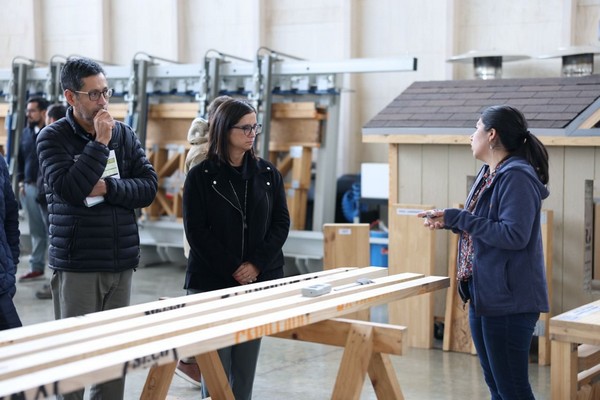New statistics on the secondary industry, the development of R&D technologies, and the generation of information enabling the update of regulatory standards are some of the actions carried out by INFOR to incentivize the use of wood and establish it as the material of the future for housing construction in the country.
The Forestry Institute (INFOR) concluded its project "Strengthening Technological Capabilities for the Development of the Secondary Wood Industry Through Public Goods for the Construction Sector," supported by CORFO. The closing event took place at INFOR's Structural Wood Laboratory in its Biobío headquarters, located in the commune of San Pedro de la Paz.
The initiative, developed between 2018 and 2024, improved the production and commercial chain of this material to add greater value to products derived from its processing.
Sandra Gacitúa, Executive Director of INFOR, stated, "We succeeded in adding value to the use of wood for construction. Additionally, we generated new statistics on the secondary industry, technology use, and updates to regulations for wood-based housing construction."
Indeed, the professionals in charge aimed to incorporate new wood species into regulatory frameworks, enhance R&D technological monitoring, and develop better infrastructure and equipment in the field.
The project included a public-private advisory council chaired by the Undersecretary of Agriculture, Ignacia Fernández, and composed of various institutions such as Pymemad, CORMA, the Ministry of Housing, and the Chilean Chamber of Construction (CCHC).
"The Forestry Institute has generated statistics for over 60 years, but primarily for the primary industry. Having data on the secondary industry allows us to start developing public policies, especially in a context of climate and housing crises," said Susana Benedetti, director of this initiative.
Meanwhile, Pamela Gatti, the Regional Minister of Agriculture for Biobío, highlighted INFOR's work in "promoting innovation, technological transfer, and sector-related regulations, aligning with the Government's efforts toward sustainable construction."
Wood for a Sustainable Future.
One of the major challenges identified by experts was raising awareness about the quality of wood compared to other materials like reinforced concrete and steel for construction.
"We're not talking about emergency housing. In the past, wood was seen as a more precarious construction material, but updated regulations and new technologies now allow for buildings that meet the same standards as other materials," said Susana Jara, a construction engineer from the Technical Division of Studies and Housing Promotion at the Ministry of Housing.
Similarly, Frane Zilic, Manager of Biobío Madera at CORFO, asserted that wood "is the best solution, and we will advocate for its predominant role due to its sustainable credentials. The construction industry needs wood for its environmental, social, and economic benefits."
The seminar also featured renowned architect Gonzalo Mardones, who won the VI Architecture in Wood Competition (2022) with the "Bambú Kindergarten." According to the national creator, this material is gaining traction among leading international builders.
"Wood offers a unique possibility as a material—there is nothing like it in the face of environmental change. It is the noblest, most beautiful, oldest material in the world and the closest to humanity. No material is eternal, but properly treated wood has durability," he concluded.







Comentarios (0)
No hay comentarios aún. ¡Sé el primero en comentar!
Deja un comentario